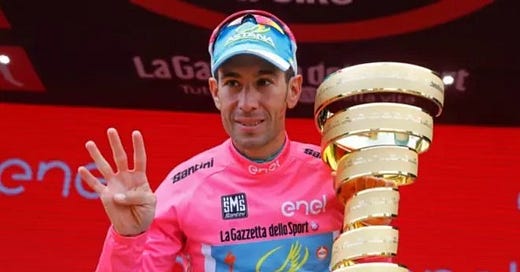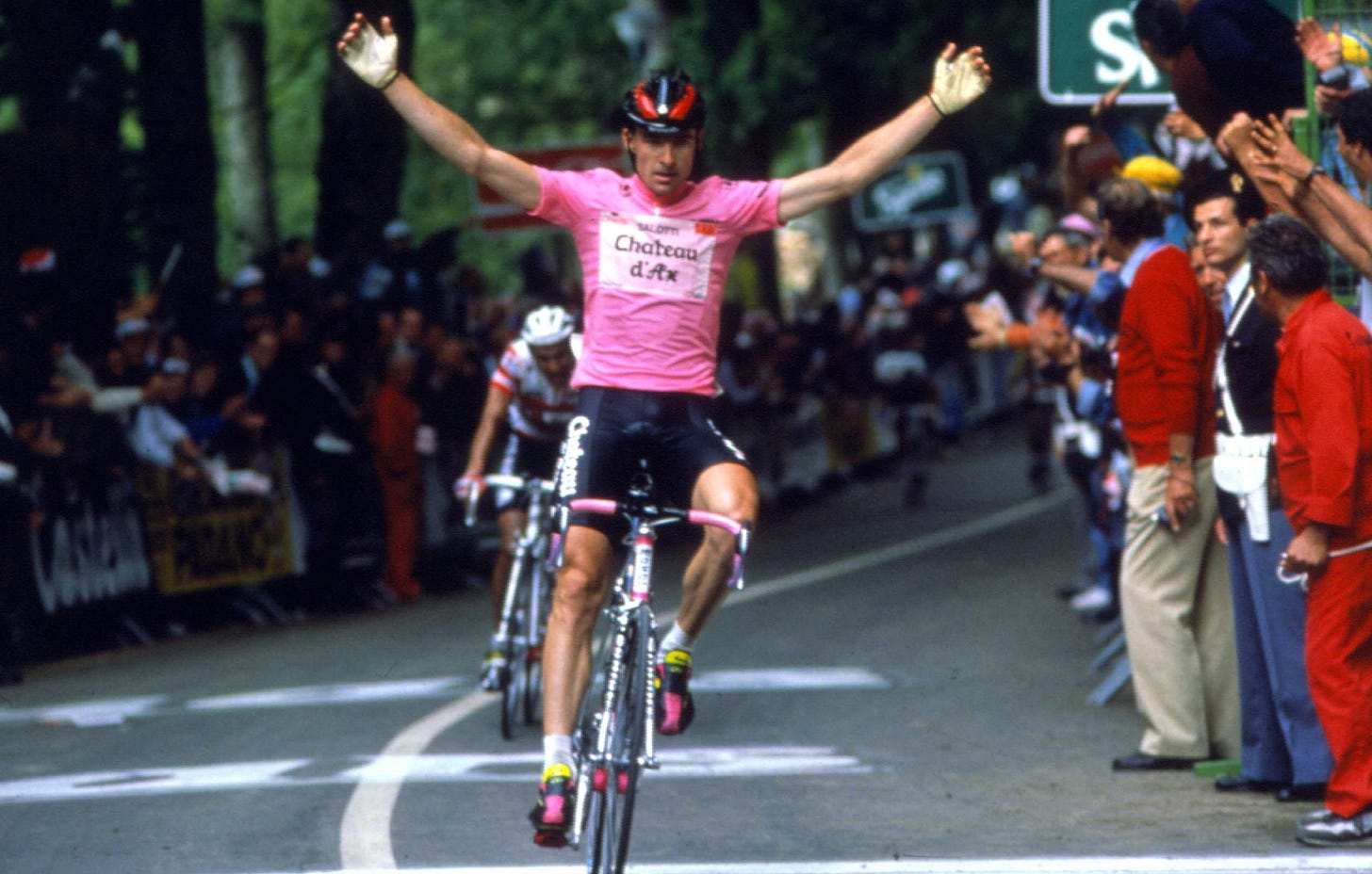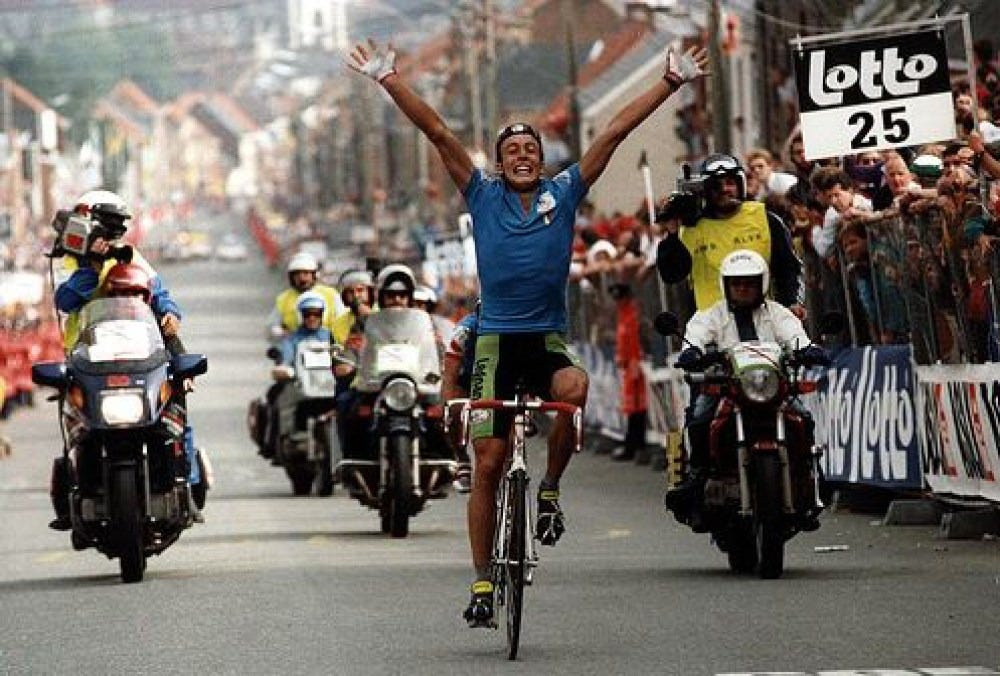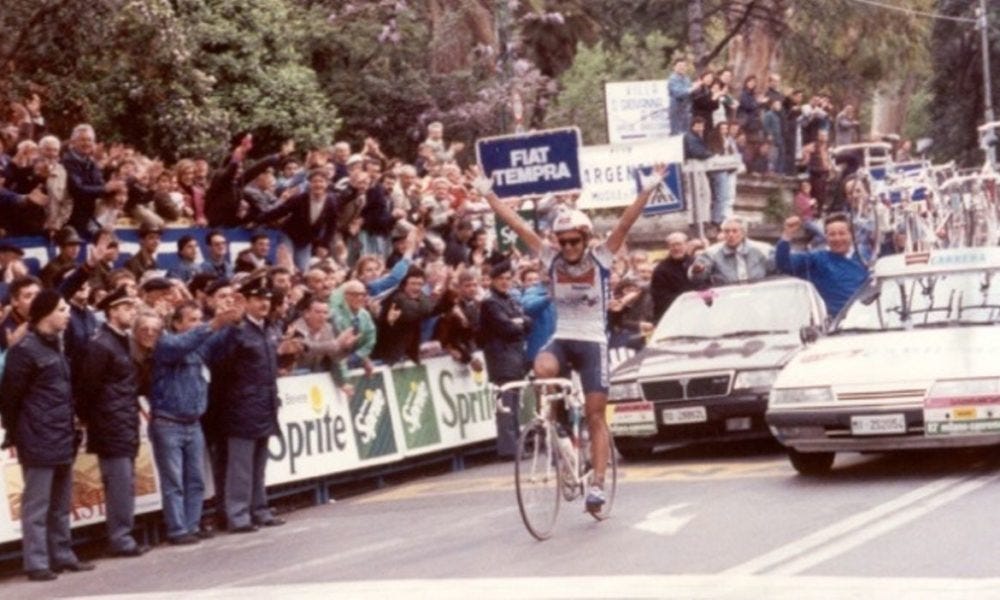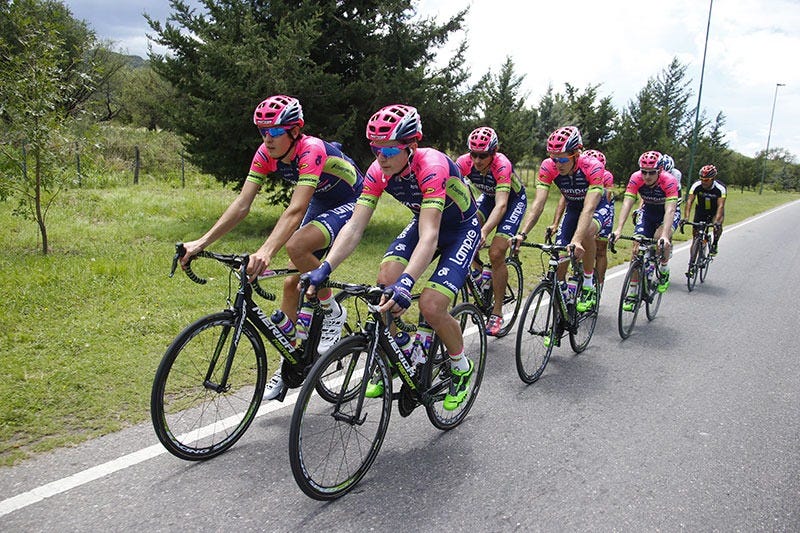The fall of a cycling empire: What’s gone wrong in Italy?
Italy went from producing lots of winners to a historic drought. Top Italian champions and insiders explain why in Cycling Report.
The history of cycling has long been shaped by a handful of nations that, due to their culture, terrain and legacy, became more than just the countries with the most wins or the largest number of elite riders. Italy, France, Belgium, Spain and the Netherlands make up the ‘old guard’ of cycling history, but in today’s global cycling order, tradition no longer guarantees triumph. As in so many other areas of sport and life, cycling has embraced globalisation, and nations like Slovenia, Denmark or Eritrea are now rising to challenge the established powers.
Italy’s case is particularly telling. Long seen as guardians of cycling’s epic spirit and old-school essence, they now present a Giro d’Italia (starting this Friday in Albania: you’ll find a full preview on Friday here on Cycling Report at 9 in the morning, CET) with barely any altitude above 2.000 metres and very few Italian riders with real prospects of victory. But this is nothing new.
Since Vincenzo Nibali, no Italian has won Lombardia, Sanremo or the Giro. The case of the Corsa Rosa is especially remarkable: not even during the Second World War did so many years go by without an Italian claiming the Giro d’Italia GC win.
Only Caruso’s podium in 2021, behind Egan Bernal, has slightly sweetened what has otherwise been a disappointing decade. Spain (last winning La Vuelta in 2014 with Contador) has also suffered a similar drought, though riders like Enric Mas, Alejandro Valverde, Mikel Landa or Juan Ayuso have kept the nation in the mix with regular podium finishes.
Why has no Italian champion emerged since Nibali? To tackle the unanswerable question, I turned to Italian cycling legends and journalists who know the ins and outs of the sport in Italy.
Just by chance?
Sometimes we tend to overanalyze when things are easier than they seem. I’m looking for answers to the question of why there are no Italians winning Grand Tours, as has always happened, but the reasons are simpler according to Gianni Bugno (two-time World Champion in 1991 and 1992, Giro d’Italia winner in 1990): “We are living in the era of a champion like Pogačar, so we’re all suffering it. It’s a matter of chance”.
“We are living in the era of a champion like Pogačar, so we’re all suffering it”
Gianni Bugno
“Pure talent can't be predicted, you never know when it might be born or appear”, says Maurizio Fondriest (World Champion in 1988). “Spain is a good example. After Indurain or Valverde, a rider like Juan Ayuso has emerged, someone who can win the Giro. It's the same in Italy, with Moser, Bugno, myself, Nibali... But now we don't have great climbers for the GC. But I believe they will come”, adds Fondriest.
Another champion, Claudio Chiappucci (Milano Sanremo 1991 winner), points to different factors. For him, technological progress means that some riders “arrive at the pro ranks already exhausted. At 20, they’re like we were at 25,” he says.
There’s also the phenomenon of globalisation: “There are countries where cycling was barely known. In Slovenia, there are very few riders, but they’re top quality compared to places like Italy or Spain, where cycling has long been almost a cultural matter.”
The journalist Stefano Rizzatto (RAISport) adds a new twist to the debate and takes the drama out of it. "La vita è una ruota che gira, as we say in Italian, and popular wisdom can apply to cycling too. Cycling has become more global than ever. And Italy is going through a relative drought since Vincenzo Nibali. Relative, because over the past decade Italian riders have won 4 out of 5 Monuments, the last Giro claimed by an Italian was in 2016, the last Tour in 2014, and the last Vuelta in 2015”.
If we look at the numbers, it’s a bit unfair to talk about a crisis… but the years are starting to add up. “I never like to speak of a crisis”, says Stefano. “Right now, Italy boasts great talents and success on the track, in sprints and TTs with Ganna and Milan, and a complete champion like Longo Borghini on the women’s side… but fewer young riders for Grand Tours. Apart from Slovenia and Denmark, could it be that no other country really has them either?"
Italy has fewer young riders for Grand Tours. Apart from Slovenia and Denmark, could it be that no other country really has them either?
Stefano Rizzatto
The analysis wouldn’t be complete without the input of Gabriele Gianuzzi (A la Cola del Pelotón, Ventagli, Ultimo Uomo). He’s sharp, analytical and always looking for the other side of the coin. I know this well, as we’ve spent dozens of hours recording together on A la Cola del Pelotón, and he approaches this topic with the same insightfulness. So, why is Italian cycling lacking that much a true champion?
“This is the million-dollar question in Italian sport. And the answer is tied to that million too. There’s a lack of money, a lack of investment, a lack of structure… and a lack of safety. Not many new people are taking up cycling. Riding a bike in Italy isn’t safe. And it’s getting worse”, says Gianuzzi.
Italians have long had a reputation for somewhat reckless driving and for showing less respect to cyclists than in other countries. That’s one of the reasons most professional teams have gradually shifted their training camps and preseason bases from Italy and France to Spain. But how much does this really matter when it comes to professional cycling? Gabriele isn’t the only one who thinks it does.
“Riding a bike in Italy isn’t safe. And it’s getting worse”
Gabriele Gianuzzi
According to Maurizio Fondriest, the problem lies at the grassroots level. Echoing what Gabriele Gianuzzi pointed out, Fondriest says that "fewer young people want to become cyclists compared to before. There’s a lack of teams, but more importantly, safety is a real issue. Families are afraid. Back in our day there was less traffic. Italy is a densely populated country with heavy traffic. In Spain, for example, there’s a stronger culture of respect towards cyclists and stricter laws for drivers. That’s not the case in Italy. We are introducing bike lanes and other measures, but it’s difficult".
Another issue, Fondriest tells me, is that “the sons of great champions aren't becoming professional cyclists. My son doesn't ride, nor do the sons of Bugno, Argentin, Moser... DNA matters in cycling. Look at Merckx, Van der Poel…”
No Italian teams in the WorldTour: cause or consequence?
Since 2016, there hasn't been a single Italian team in the top tier of world cycling.
When Lampre–Merida evolved into the powerhouse UAE Team Emirates in 2017, Italian cycling entered a kind of diaspora. Italian riders and staff have since spread out, mainly integrating into heavily Italianised teams such as UAE, Astana or Bahrain. Meanwhile, at ProTeam level the only notable new project has been the team led by Alberto Contador and Ivan Basso, currently racing as Polti VisitMalta.
However, several historic Italian outfits have disappeared from the scene, including Gianni Savio’s Androni and Vini Zabù. Today, alongside Polti, two other Italian teams remain at ProTeam level: VF Group–Bardiani and Team Solution Tech–Vini Fantini. Yet all three are a long way off the strength and structure of second-tier leaders like Tudor, Uno-X or Q36.5.
Is it a consequence of the lack of great champions, coinciding with Nibali’s last Grand Tour win and shortly after Fabio Aru’s Vuelta a España victory, or simply a matter of chance? Have major Italian sponsors shifted their focus to more profitable sports? Could it be a cause of the lack of springboards for young Italian talents coming through?
“Not having a WorldTour team is certainly part of the problem”, Stefano Rizzato tells me. “But I wouldn't say it's the biggest or most important part. A national WT team would allow athletes to develop without being rushed, in an Italian-speaking, more relaxed environment. Italian riders perhaps mature more slowly and right now they need to perform from a very young age to earn contracts with foreign teams. It’s not ideal, but even so, I don’t think we should use that as an excuse”.
“If there’s no investment from sponsors it’s partly because there isn’t a great Italian champion, but then there are teams like UAE or Astana that are almost entirely Italian structures”, as Claudio Chiappucci reminds me.
For Gianuzzi, having a WT Italian team “it’s a problem or a solution”, he reflects. “I don’t think it’s a direct cause of not having a major winner. Having a national team in the top category isn’t always a guarantee of success. There are many examples: CSC in Denmark or Movistar in Spain. Either the national riders are really good, or they suffer. Only one can be the leader. And Italy also experienced this with Liquigas”.
As several experts point out to me, the fact of not having a purely Italian team doesn’t help, but we can’t pinpoint it as the only cause of this ‘drought’.
Gianni Bugno turns the conversation towards a topic that irritates him and, from his point of view, is part of the global problem in cycling: it's not that there are fewer teams because there’s more or less talent, but because of UCI policy: “The fact that there is no Italian team in WT has to do with the fact that there are only two invitations for the Grand Tours [Editor’s note: 3 in 2025 and probably also in 2026]. It's hard to create a team in Italy or Spain, which requires several million euros, without the guarantee of riding the Giro d'Italia or La Vuelta a España. You can't promise that to the sponsor. In Spain, only Movistar remains. There used to be 10 Italian teams, and all of them had the guarantee of racing the Giro. It’s a UCI interest, but it’s not good for cycling. The system doesn’t work.
“It’s a UCI interest, but it’s not good for cycling. The system doesn’t work”
Gianni Bugno, regarding the invitation system for the Grand Tours
What about the future?
Despite the high overall level of Italian cycling, with pretty good riders such as Jonathan Milan, Filippo Ganna, Giulio Ciccone, Christian Scaroni, Filippo Zana, and veterans Diego Ulissi, Damiano Caruso or Matteo Trentin, among others, I want to know if any of the new generation of riders, whether they are already achieving good results or are still just 'promises', have the potential to contest a Grand Tour.
Given his abilities in both mountain stages and time trials and after his strong performance at the 2024 Giro, Antonio Tiberi (Bahrain-Victorious) may be the best option for Italian cycling in this year's Giro.
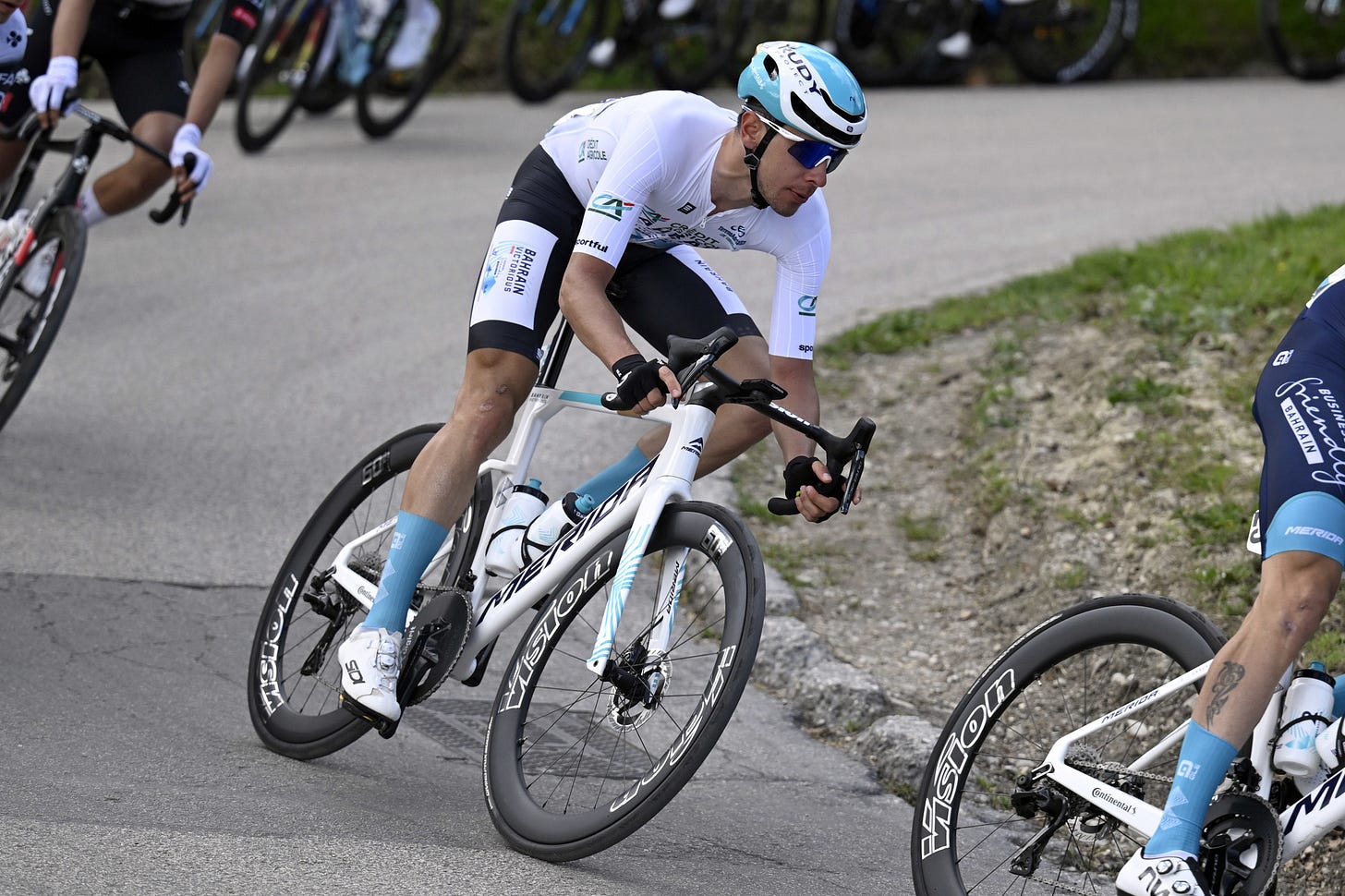
Tiberi is the most ready for a podium in this Giro, especially because of his strength in time trials. He has an excellent mentor in Damiano Caruso. But, at the moment, he is still far from Pogačar, Vingegaard and Evenepoel, says Stefano Rizzato.
Maurizio Fondriest adds several names on the conversation, apart from Antonio Tiberi. “Tiberi could become a very good rider. Fortunato is a solid rider, but not quite at the level to win a Giro. Ciccone is already 30... Then there's Lorenzo Finn, the junior world champion... but it's still too early. We need to wait. Giulio Pellizzari is good, but he lacks a bit in time trials”.
Gabriele Gianuzzi also considers Antonio Tiberi the most solid option for general classifications right now in Italian cycling, and points out the way he is managing pressure in Italy, but he adds the name of another young rider who is already being sought after by many WT teams: “The most reliable young project for general classifications is Davide Piganzoli (Polti VisitMalta)”, he says. “He’s a rider with important mentors like Basso and Contador, and he’s working very hard, especially in smaller races. Pellizzari is very strong, but I’m not sure if he’ll be able to become a potential Giro d’Italia winner. Then there’s Lorenzo Finn… For now, he’s just a prospect. He still has a lot to prove. In Italy, we’ve already had the ‘new Nibali’ story with others and that adds a lot of pressure”.
As for the future, Claudio Chiappucci is more blunt: “For now, there’s nothing on the horizon”, he says. “There are some riders with a lot of quality, but they lack consistency throughout the year. The mental strength needed to compete in a Giro is nothing like what’s required for a one-day race or a smaller stage race”.
“The mental strength needed to compete in a Giro is nothing like what’s required for a one-day race or a smaller stage race”
Claudio Chiappucci
The future, by definition, brings uncertainty… but also hope. While nothing is guaranteed, Gianni Bugno calls directly on the younger generation: “now it’s their turn to prove themselves and win”.
Now it's your turn! 👉
Enjoying the ride? The best way to stay up to date is to subscribe now so you don’t miss a single update.
You can also follow Cycling Report on Twitter, Instagram or Bluesky, and find more on my personal account. If you liked the content, sharing it really helps and keeps the project moving.

